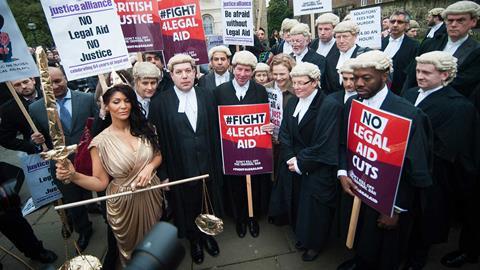A cash injection is long overdue, but not everything is at it seems in the government’s response to the criminal legal aid review. Solicitors may get less than £60m a year and not everyone will receive a 15% rise
Dominic Raab told MPs on Tuesday that his proposed package of criminal legal aid reforms matched the central £135m recommendation of retired judge Sir Christopher Bellamy’s independent review. This puts the sector on a ‘stable and sustainable footing’, he declared. However, initial analysis of the Ministry of Justice’s 104-page consultation document and 27-page impact assessment suggests Raab is not even doing the bare minimum recommended to save the sector.
Bellamy’s central recommendation constitutes a 15% uplift in criminal legal aid funding for solicitors and barristers, which roughly equates to an extra £135m a year. He stressed that £135m was the ‘minimum’ necessary to nurse the criminal legal aid sector back to health after years of neglect. Yet, of the £135m announced this week, the government would reserve £20m for ‘longer-term investment’, such as reforming the litigators graduated fee scheme (which will take years, according to Tuckers solicitor Stephen Davies). Another £2.5m is topsliced for training grants.
Bellamy said £100m of the £135m should go towards remunerating criminal legal aid firms so they can invest in recruitment, compete for talent, maintain quality, provide training and ensure retention. He stressed that £100m would not necessarily put defence firms, which have been continuously losing talent to the Crown Prosecution Service, on a par with the prosecuting agency. Yet an impact assessment for the proposed reforms states that solicitors’ firms will receive an annual uplift of only £58m-£66m (barristers will get £30m-£39m). And not everyone will get 15%.
Key proposals
- General uplift for police station fees, magistrates’ court fees, other crime lower fees, advocates’ graduated fee scheme, very-high-cost cases for solicitors, Court of Appeal fee schemes
- Restructure the litigators graduated fee scheme
- Create an advisory board
- Enable CILEx members to become duty solicitors more easily
- Fund solicitor training contracts and support solicitors to gain higher rights of audience
- Expand the Public Defender Service on a limited basis
The impact assessment states that most of the proposed fee scheme changes give fixed percentage uplifts and therefore their impact would be even across case types and providers. ‘The LGFS is the only scheme which would see a disparity in the uplifts, as funding would be increased for basic fees, fixed fees and hourly rates, but not for trial length uplifts or PPE [pages of prosecution evidence] uplifts,’ the document says.
Grouping litigators graduated fee scheme cases by solicitor offices that complete the work, the impact assessment states that only 10% of the 1,640 offices would see a 12.5%-15% uplift.
Regionally, the north-east and south-west would see a 7% increase, and London just 3%. No region would see a 15% increase. The London Criminal Courts Solicitors’ Association says its members may feel aggrieved to find out that the proposed fee for London does not correlate with the rest of England and Wales.
But spare a thought for practitioners doing prison law work – they will not receive any fee uplift at all, even though the prison population (which stood at 79,092 in December) is expected to increase by 19,000 by the middle of this decade.
Means test review
Three years after announcing a legal aid means test review, the Ministry of Justice finally published its findings and policy proposals.
Proposals for civil legal aid include increasing income thresholds using an approach based on cost of living, increasing disposable capital thresholds, disregarding property which is the subject matter of dispute and removing the means test for children under 18.
For criminal legal aid, proposals include increasing the income thresholds for legal aid at the magistrates’ and Crown courts, taking into account increases in the cost of living and private legal fees, and removing the upper disposable income threshold in the Crown court.
Practitioners are still digesting the 154-page document. However, some have already expressed concern about a civil legal aid proposal requiring recipients of universal credit with household earnings above £500 per month to go through an income assessment (they are currently ‘passported’).
Jeinsen Lam, a housing solicitor at South West London Law Centres, said it could increase the administrative burden on already stretched practitioners. The need for more evidence could become a barrier to obtaining legal aid.
The MoJ estimates that 2 million more people will have access to civil legal aid and 3.5 million more people will have access to criminal legal aid in the magistrates’ courts as a result of its package of reforms.
However, Law Society president I. Stephanie Boyce worries that despite being eligible for legal advice, people will be unable to access it. ‘Our research on civil legal aid deserts and our heatmaps identifying ageing and increasingly scarce duty solicitors show there are many parts of the country where access to justice is in peril,’ she said.
While the government commissioned an independent review for criminal legal aid, it kept the review of civil legal aid sustainability in-house.
Asked when the findings of the internal review will be published, the ministry told the Gazette that this document will not be made public. ‘We continue to monitor the sustainability of the civil legal aid market and will publish the government’s response to a recent consultation on the future of housing legal aid shortly. We will also begin a pilot to test the impact of early legal advice,’ an MoJ spokesperson said.
The government says it wants to focus reform on improving early engagement at the beginning of criminal cases and reducing the court backlog.
Dr Laura Janes, who recently stepped down as legal director at the Howard League for Penal Reform, writes on the Legal Action Group website that it is ‘hard to see how the needs of this particularly vulnerable community will be met if the number of firms doing prison law continues to decline as it has over the last decade. The number of prison law offices has declined by around two-thirds in the past decade and, without the so-called boost that the rest of the [sector] will get, this trend will surely continue’.
As well as recommending a minimum £135m extra a year, Bellamy said there was no scope for further delay. The review was announced over three years ago and practitioners have been shouting about the underlying problems for years. Raab insists he must consult for 12 weeks – even though predecessor Robert Buckland QC suggested he shorten the consultation window to eight weeks.
The reforms would come into force in October. But how quickly will practitioners see the cash? It recently emerged that the ministry spent only a fifth of an annual £51m injection for a package of accelerated measures announced in 2020 over the course of the first year. Ministers said the slow spend was due to multiple factors, including the impact of Covid-19 and a lower than expected number of providers making claims for certain accelerated items.
Then there is the Public Defender Service. The ministry wants to expand it, on a limited basis ‘initially’, where there is potentially unmet legal need or risk of market failure or disruption. ‘In the longer term, the government believes the PDS has an important role to play as part of ensuring sustainable and stable provision of criminal defence,’ the consultation paper states.
Alarm bells should be ringing. Criminal defence firms have lost too many lawyers to the CPS. They cannot afford to lose more to the PDS and they cannot afford to lose work to the PDS.
Writing in the Gazette this week (see box, right), justice minister James Cartlidge said the proposed reforms are an opportunity to make the legal aid system better. Initial analysis suggests the government must do better on the cash front.
Legal aid for the 21st century
We have reached a significant milestone on the road to legal aid reform, writes justice minister James Cartlidge MP. The government’s consultations on the future of criminal legal aid and legal aid means-testing pave the way for the most important changes in a decade.

Our proposals will put criminal legal aid on a sustainable footing for years to come – for the benefit of defendants and victims, and all those who work in the system. And they will make for fairer means-testing, opening up civil and criminal legal help for millions more people across the country, providing more support to those who need it most.
I want to thank Sir Christopher Bellamy and his panel for this important review, and all who contributed to it. And I particularly want to thank our legal profession, for their patience in getting to this stage, and their continued hard work and professionalism.
Criminal legal aid is a topic of much debate, and we have heard calls for both immediate investment, and the need to focus on future reform. Our proposals will do both. We are boosting the system where it is most needed, as well as setting it on the right track for the future.
That starts with significant investment to make sure that the profession is paid fairly. Sir Christopher recommended a 15% uplift to fee schemes, and we are proposing to do just that for the majority of schemes – as soon as possible. Our planned reforms and investment across other areas will increase spending by up to £135m a year, in line with Sir Christopher’s recommendations. On top of our additional funding to support court recovery, this takes taxpayer support for criminal legal aid to £1.2bn, the highest level in a decade.
But this is not just about an immediate cash injection. We want to reform fee schemes in the long-term, so they properly reflect the work our legal profession is doing today, not when the schemes were first put in place. For example, we want to boost pay for lawyers representing suspects in police stations, to tackle, as Sir Christopher put it, the ‘perverse incentive’ that encourages practitioners to wait and represent defendants in Crown courts because it pays better. This will improve the advice available in police stations and stop cases going to court unnecessarily, delivering speedier justice to victims.
Our reforms go much further than just the here and now. In the long-term, we want to shape our legal aid system so it is fit for the 21st century. We want to create a more modern, flexible system that reduces pressure on courts – that provides swifter access to justice by making better use of early engagement.
And, if implemented, our changes will open the door for a more diverse range of practitioners – supporting a greater role in our justice system for CILEx professionals, and investing in solicitor training and accreditation, including higher rights of audience. We want to open up the profession to anyone with the talent to succeed – regardless of their background. And our proposed Advisory Board will represent every part of the profession, helping to shape criminal legal aid policy moving forward.
These proposals will make a system that is better for victims and defendants, and better for everyone working in the system. They will give our criminal legal aid system much-needed long-term stability, and make sure that publicly funded criminal law practice is seen as a viable, fulfilling career. I urge every part of the profession to get involved in our consultation – open for the next 12 weeks – so we can hear all voices and perspectives.
Given the scale of reform we are proposing and the complexity of the criminal justice system, it’s vital that we consult fully and fairly and that we give all interested parties, including those beyond the legal professions, time to engage.
These are landmark reforms - an opportunity to change our system for the better. We must seize it with both hands.





































1 Reader's comment